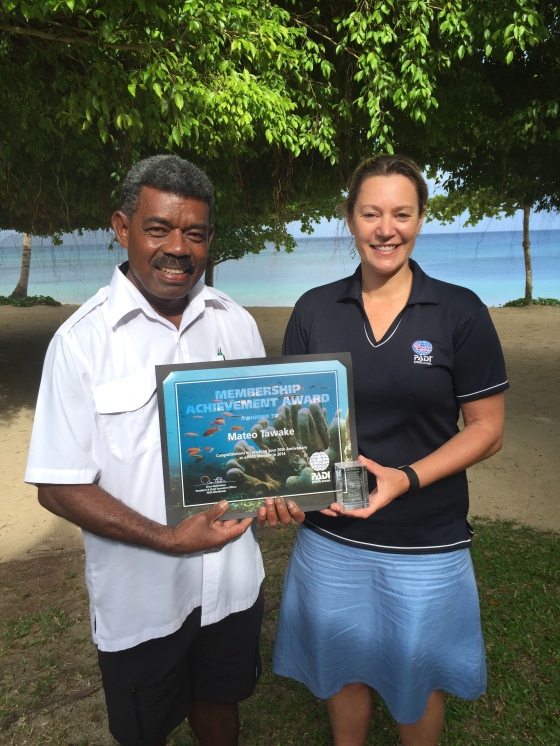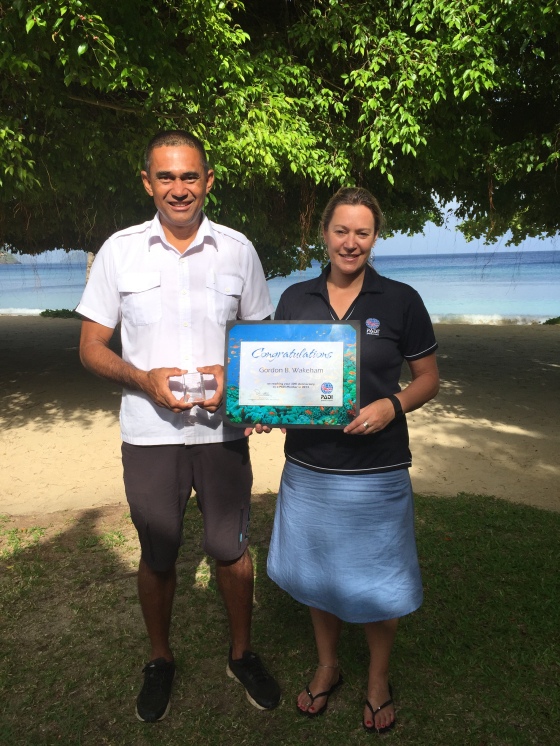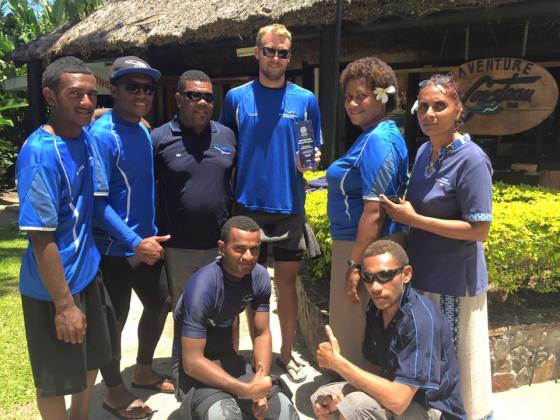Full story on Mike's blog:
A blog about the great scuba diving around Fiji. Some of the highlights of living and working in Fiji is the diving on the soft coral reefs with sharks, mantas and teeming life on the reefs.
Tuesday 29 December 2015
Celebration - The BAD Cut
Full story on Mike's blog:
Thursday 17 December 2015
Characteristics of the shark fisheries of Fiji
Limited information is available on artisanal and subsistence shark fisheries across the Pacific. The aim of this study was to investigate Fiji’s inshore fisheries which catch sharks.
In January and February 2013, 253 semi-directive interviews were conducted in 117 villages and at local harbours on Viti Levu, Vanua Levu, Taveuni, Ovalau and a number of islands of the Mamanuca and Yasawa archipelagos.
Of the 253 interviewees, 81.4% reported to presently catch sharks, and 17.4% declared that they did not presently catch any sharks.
Of the 206 fishers that reported to catch sharks, 18.4% targeted sharks and 81.6% caught sharks as bycatch.
When targeted, primary use of sharks was for consumption or for sale. Sharks caught as bycatch were frequently released (69.6%), consumed (64.9%) or shared amongst the community (26.8%).
Fishers’ identification based on an identification poster and DNA barcoding revealed that at least 12 species of elasmobranchs, 11 shark and one ray species (Rhynchobatus australiae) were caught.
This study, which is the first focused exploration of the shark catch in Fiji’s inshore fisheries, suggests that the country’s artisanal shark fisheries are small but have the potential to develop into larger and possibly more targeted fisheries.
 Published on 02. December 2015
Published on 02. December 2015
Characteristics of the shark fisheries of Fiji | Shark Year Magazine:
'via Blog this'
In January and February 2013, 253 semi-directive interviews were conducted in 117 villages and at local harbours on Viti Levu, Vanua Levu, Taveuni, Ovalau and a number of islands of the Mamanuca and Yasawa archipelagos.
Of the 253 interviewees, 81.4% reported to presently catch sharks, and 17.4% declared that they did not presently catch any sharks.
Of the 206 fishers that reported to catch sharks, 18.4% targeted sharks and 81.6% caught sharks as bycatch.
When targeted, primary use of sharks was for consumption or for sale. Sharks caught as bycatch were frequently released (69.6%), consumed (64.9%) or shared amongst the community (26.8%).
Fishers’ identification based on an identification poster and DNA barcoding revealed that at least 12 species of elasmobranchs, 11 shark and one ray species (Rhynchobatus australiae) were caught.
This study, which is the first focused exploration of the shark catch in Fiji’s inshore fisheries, suggests that the country’s artisanal shark fisheries are small but have the potential to develop into larger and possibly more targeted fisheries.
Characteristics of the shark fisheries of Fiji
Characteristics of the shark fisheries of Fiji
Kerstin B. J. Glaus, Irene Adrian-Kalchhauser, Patricia Burkhardt-Holm, William T. White, Juerg M. Brunnschweiler
Characteristics of the shark fisheries of Fiji | Shark Year Magazine:
'via Blog this'
Monday 14 December 2015
Valued PADI Members in FIji get Recognition Awards from PADI Oceania
As PADI Regional Manager it's always great to meet members all over my region. So many have been in this industry for a long time and their experience and knowledge is invaluable. The stories they have to tell about their life as PADI Pro's could entertain divers for hours!
It was an absolute pleasure to recently present awards and certificates to the PADI Members below in Fiji. These PADI Professionals have invested at least 20 years into the dive industry.
It is a great part of the job where as Regional Manager I get to say thanks on behalf of PADI.
Recognition Awards for Valued PADI Members | PADI Pros Oceania:
Jen Clent - Regional Manager | December 8, 2015
Thursday 25 June 2015
Thursday 9 April 2015
Fiji voted the Best Shark Diving Destination by global dive bible, EZDIVE Magazine
FIJI has gained a significant foothold in the lucrative shark dive market after being voted the Best Shark Diving Destination by global dive bible, EZDIVE Magazine.
Tourism Fiji's marketing manager for the Asia Market Kathy Koyamaibole received the award on behalf of the country at the Dive Resort Travel Expo in Shanghai, China, last month.
The expo was the only professional diving exhibition in China, developed specifically for the diving industry in Shanghai and attracts exhibitors — enthusiastic diving resorts and live-aboard operators — from all over the Asia-Pacific region.
Shark diving tourism was worth about $87million for Fiji annually.
"Fiji's shark dive was definitely top of mind for most of the dive clubs and visitors to the expo," Ms Koyamaibole said.
"Receiving this award was a formalisation of that. Where in the world can you dive and expect to see more than seven species of sharks in one dive while also feeding them without cages?"
"That's why Fiji is no doubt the best destination to experience shark diving."
Partners and Fijian resort representatives who attended the expo shared similar sentiments, saying the event was an excellent platform to market Fiji's dive tourism.
Leleuvia Island Resort manager Colin Philp said the opportunities for Fiji Tourism were endless.
"The expo has been an amazing opportunity for Leleuvia Island Resort to exhibit to the lucrative Chinese dive market," he said.
"The quality of the expo, the high percentage of travel agents and contacts made with dive clubs and service suppliers far outweigh the costs in attending so we hope to be back next year."
Volivoli Beach Resorts' Susie Erbe, a frequent exhibitor at the dive expo shows in Asia, said she was very impressed with the increased volume of visitors.
"They seemed genuinely interested in booking dive holidays and for Fiji in particular," she said.
"I feel the show is now a necessity for those wishing to reach divers based in China."
Top shark dive spot - Fiji Times Online
Tourism Fiji's marketing manager for the Asia Market Kathy Koyamaibole received the award on behalf of the country at the Dive Resort Travel Expo in Shanghai, China, last month.
The expo was the only professional diving exhibition in China, developed specifically for the diving industry in Shanghai and attracts exhibitors — enthusiastic diving resorts and live-aboard operators — from all over the Asia-Pacific region.
Shark diving tourism was worth about $87million for Fiji annually.
"Fiji's shark dive was definitely top of mind for most of the dive clubs and visitors to the expo," Ms Koyamaibole said.
"Receiving this award was a formalisation of that. Where in the world can you dive and expect to see more than seven species of sharks in one dive while also feeding them without cages?"
"That's why Fiji is no doubt the best destination to experience shark diving."
Partners and Fijian resort representatives who attended the expo shared similar sentiments, saying the event was an excellent platform to market Fiji's dive tourism.
Leleuvia Island Resort manager Colin Philp said the opportunities for Fiji Tourism were endless.
"The expo has been an amazing opportunity for Leleuvia Island Resort to exhibit to the lucrative Chinese dive market," he said.
"The quality of the expo, the high percentage of travel agents and contacts made with dive clubs and service suppliers far outweigh the costs in attending so we hope to be back next year."
Volivoli Beach Resorts' Susie Erbe, a frequent exhibitor at the dive expo shows in Asia, said she was very impressed with the increased volume of visitors.
"They seemed genuinely interested in booking dive holidays and for Fiji in particular," she said.
"I feel the show is now a necessity for those wishing to reach divers based in China."
Top shark dive spot - Fiji Times Online
Thursday 29 January 2015
Great Resource & Training for Coral Identification
The Coral Identification Capacity Building Program is pleased to announce the release of our revised coral identification training resources - Coral Finder Toolkit 2.0
Coral Finder Toolkit 2.0 is a proven suite of practical tools for learning coral identification in the Indo Pacific comprised of the Coral Finder, the Coral Hub website and the Coral Finder Toolkit disc.
Of particular interest to reef people are the NEW revised and updated FREE training movies in English AND NOW Bahasa Indonesia! The new movies have many improvements gleaned from our experience of training over 400 people in coral identification and are authored in high definition to provide superior visual detail when viewing via file or high bandwidth stream.
CFT 2.0 coral ID training movies in English <http://www.coralhub.info/learn/coral-finder-toolkit-2-training-movies-english/> http://www.coralhub.info/learn/coral-finder-toolkit-2-training-movies-english/
CFT 2.0 coral ID training movies in Bahasa Indonesia <http://www.coralhub.info/learn/coral-finder-toolkit-2-training-movies-bahasa-indonesia/> http://www.coralhub.info/learn/coral-finder-toolkit-2-training-movies-bahasa-indonesia/
The Coral Finder www.byoguides.com <http://www.byoguides.com/> empowers students, divers, naturalists and researchers to ID corals to genus where it really matters…. underwater. It’s Visual Navigation system overcomes the problem of growth form variation and provides a powerful cross reference back to Corals of the World for post dive follow up to species level.
The Coral Finder is supported by the Coral Hub website - a resource with a graded learning pathway for self-paced learning for beginner through intermediate to advanced level knowledge.
The Coral Hub website includes:
• a free complete video training course (Training Movies: available in English and in Bahasa Indonesian, and Revision Movies) aimed at bringing beginners through to intermediate level coral identification anywhere in the Indo Pacific
• free downloadable self revision tools for people wishing to refresh their coral identification skills http://www.coralhub.info/learn/self-testing-resources/
• a jargon busting terminology tool (the Termigator) to simplify basic coral taxonomy http://www.coralhub.info/terms/
• links to deeper knowledge.
In summary the Coral Finder Toolkit:
• empowers motivated individuals to teach yourself coral identification (or learn via a workshop with over 400 people trained to date)
• contains accurate, plain language visual training resources
• synthesises the basics of coral identification in a practical, engaging and visually rich way
• is a “real world to theory” translator with a proven high (~80%) transfer of skills to the workplace
Coral Hub – Resources & Training for Coral Identification
Thursday 15 January 2015
Fiji's Reefs @ National Geographic Magazine
By Les Kaufman
|
Tuesday 13 January 2015
In Fiji, diving with big, hungry sharks - BBC
A surreal scene
In the crystalline waters off Fiji’s main island of Nadi, Scuba divers can take the plunge with a mind-boggling variety of toothy predators: tiger sharks, nurse sharks, whitetip reef sharks, lemon sharks – even massive bull sharks.Pictured here, a trained feeder 25m below sea level pulls mahi mahi and tuna heads from a large green trash bin.
Without a cage or any protection, the diver dangles the meat before the sharks. And with that, the feeding begins. (Lia Barrett)
BBC - Travel - Slideshow - In Fiji, diving with big, hungry sharks
Thursday 8 January 2015
World's Best Scuba Diving in Fiji - Sport Diver
From seductive reefs covered in rainbow-colored soft corals to heart-racing encounters with blacktip and tiger sharks, it's no wonder divers are smitten with Fiji.
On some dives, the eyes say it all, and we’re all a bit wild-eyed as a silky joins the shark-feeding frenzy in Beqa Lagoon, sweeping in close, almost mischievously, before swimming off. Just when I think we’ve experienced our dive climax, a 16-foot tiger shark slips into the scene.
The hungry tornado of whitetip, blacktip, nurse, bull, lemon and reef sharks, plus a bundle of 800-pound grouper, clear the way for her entrance. Her imperial demeanor commands a respect that both fish and divers honor.
She has the faded stripes of a mature Galeocerdo cuviera and a mangled dorsal fin — a scar from mating and a telltale sign she’s female. She glides over our heads and disappears as seamlessly as she came in. Now that’s how a lady makes an entrance.
Full article here: World's Best Scuba Diving | Fiji | Sport Diver
Subscribe to:
Posts (Atom)




